Len Sak's cartoons 1990-1994
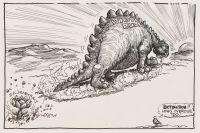
February 1990 - President FW de Klerk announces at the opening of Parliament the lifting of a 30-year ban on the African National Congress, the Pan Africanist Congress and other anti-apartheid organisations. He also announces the suspension of the death sentence until further review, the release of some political prisoners and the partial lifting of the restrictions on the media and on some detainees. Nelson Mandela is freed after 27 years in jail. - Len Sak
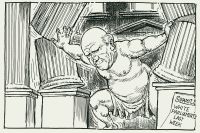
February 1990 - President FW de Klerk announces at the opening of Parliament the lifting of a 30-year ban on the African National Congress, the Pan Africanist Congress and other anti-apartheid organisations. He also announces the suspension of the death sentence until further review, the release of some political prisoners and the partial lifting of the restrictions on the media and on some detainees. Nelson Mandela is freed after 27 years in jail. - Len Sak
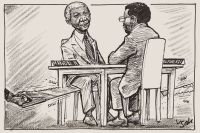
March 1990 - Meetings between Nelson Mandela and Chief Mangosuthu Buthelezi of the Inkatha Freedom Party are called off due to a flaring up of violence in the Vaal - Len Sak
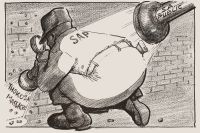
June 1990 - It became increasingly obvious that there was a high level of police violence as early as June, after the February 1990 announcement in Parliament. Police violence was still making an important impact on the political situation in South Africa - Len Sak
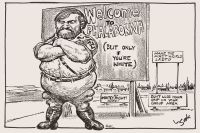
July 1990 - You could see that there was a very militant right-wing reaction to the government intention to start negotiating with the liberation movements - Len Sak
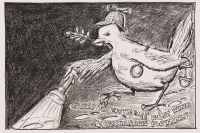
July 1990 - The dove was a symbol that I used throughout the period because of its appropriateness. One needed a commentator - Len Sak
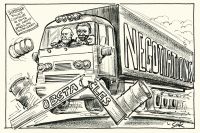
July 1990 - It was evident that Nelson Mandela and FW de Klerk had to push ahead. There was a joint determination to find a way through - the obstacles were being smashed - Len Sak
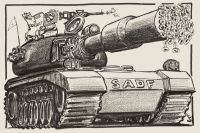
August 1990 - The African National Congress (ANC) and the South African government issue a joint declaration, the "Pretoria Minute". The ANC announces that it will immediately suspend all armed actions, while the government undertakes to consider lifting the State of Emergency in Natal and to continue reviewing security legislation and its application. I used the flower as a symbol of readiness to take the military component out of the negotiations and, in fact, actively renounce it. That was a very important step - Len Sak
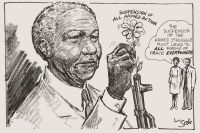
August 1990 - The African National Congress (ANC) and the South African government issue a joint declaration, the "Pretoria Minute". The ANC announces that it will immediately suspend all armed actions, while the government undertakes to consider lifting the State of Emergency in Natal and to continue reviewing security legislation and its application. I used the flower as a symbol of readiness to take the military component out of the negotiations and, in fact, actively renounce it. That was a very important step - Len Sak
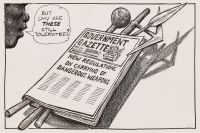
August 1990 - This refers to the government's sanctioning of Zulu tribal militancy. The fact that traditional weapons still seemed to be acceptable gave a signal to people who still saw violence as a way of expressing a political position, or trying to achieve a political advantage - Len Sak
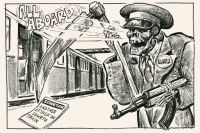
August 1990 - These terrible train massacres seemed to be almost inevitable, and unexplained and unstoppable. That's where the guard became death itself, and travelling by train was like courting death. And who was behind this? And what forces were at play? - Len Sak
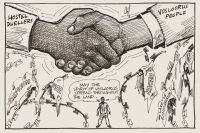
August 1990 - There was a sort of rapprochement between the township people and the hostel inhabitants which, of course, was the battleground between the Inkatha Freedom Party supporters and the backers of the African National Congress. There seemed to be a little bit of a breakthrough - Len Sak
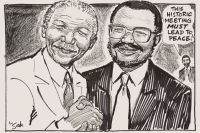
September 1990 - The African National Congress and the Inkatha Freedom Party announce that they have held high-level talks in Durban to discuss ways of ending violence in Natal and in the townships on the Reef - Len Sak
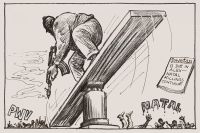
September 1990 - The African National Congress and the Inkatha Freedom Party announce that they have held high-level talks in Durban to discuss ways of ending violence in Natal and in the townships on the Reef - Len Sak
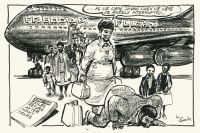
October 1990 - President FW de Klerk announces that 20 000 exiles will be allowed to return to South Africa - Len Sak
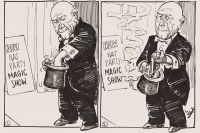
October 1990 - This cartoon represents the opening of the National Party to all race groups, but did de Klerk think that the process would be a simple one? There was so much baggage – symbolised by a smoking gun - Len Sak
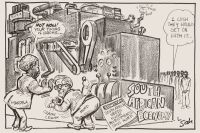
December 1990 - At the African National Congress's first national consultative held inside South Africa it rejects a call to relax international sanctions - Len Sak
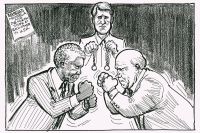
December 1990 - At the African National Congress's first national consultative held inside South Africa it rejects a call to relax international sanctions - Len Sak
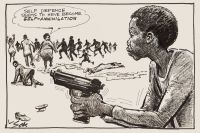
January 1991 - The African National Congress approves the creation of "defence units" to protect township residents. Self-defence is a double-edged sword. The difficulty was controlling these defence teams once they were given sanction to use arms. And yet, one could see why people felt they were not being properly protected - Len Sak
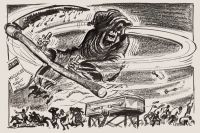
May 1991 - Another massacre. These massacres were a tragically recurring factor - Len Sak
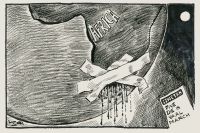
May 1991 - It wasn't a bloodless transition by any means. The casualty figures were huge. There was a lot of violence and a lot of it was politically-driven. It wasn't the classic revolution of the oppressed against the oppressor - Len Sak
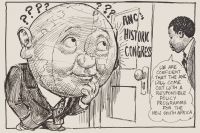
July 1991 - The African National Congress holds its first national conference. Nelson Mandela is elected president, Walter Sisulu deputy president and Cyril Ramaphosa is appointed secretary-general - Len Sak
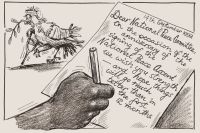
September 1991 - The National Peace Accord was signed in Johannesburg by 23 organisations and political parties, including the African National Congress and the Inkatha Freedom Party, trade unions, religious organisations and civic organisations, as well as the government - Len Sak
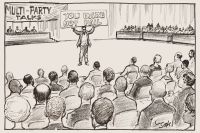
November 1991 - Planning for the start of the Convention for a Democratic South Africa (Codesa) - Len Sak
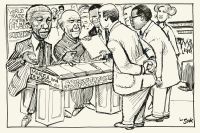
December 1991 - The Convention for a Democratic South Africa (Codesa) steering committee reaches an agreement whereby all parties will commit themselves "politically and morally" to put Codesa's decisions into effect. These decisions, however, will not be legally binding - Len Sak
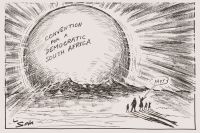
December 1991 -The Convention for a Democratic South Africa (Codesa) holds its first meeting. Seventeen of the 19 parties attending the convention sign a Declaration of Intent committing themselves to multiparty democracy - Len Sak
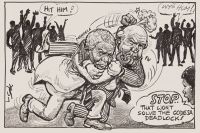
December 1991 - Heated verbal exchanges take place between President FW de Klerk and African National Congress President Nelson Mandela at the Convention for a Democratic South Africa (Codesa) talks - Len Sak
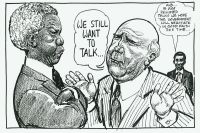
December 1991 - Heated verbal exchanges take place between President FW de Klerk and African National Congress President Nelson Mandela at the Convention for a Democratic South Africa (Codesa) talks - Len Sak
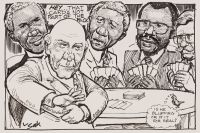
February 1992 - President FW de Klerk announces that a referendum for whites only will be held on 17 March - Len Sak
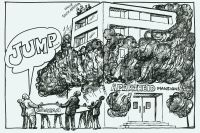
March 1992 - The referendum would determine the extent of white support for the continuation of the political reform process - Len Sak
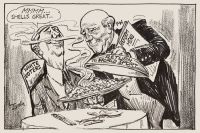
March 1992 - The return to world sport was a strong incentive to white voters - Len Sak
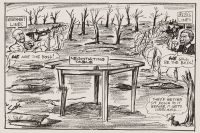
May 1992 - Codesa II (Convention for a Democratic South Africa II) ends without any significant progress being delivered. Failure to resolve the deadlock on issues related to the the Constitution – Len Sak
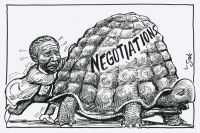
May 1992 - The tortoise suggests the slowness of the Convention for a Democratic South Africa (Codesa) negotiating process - Len Sak
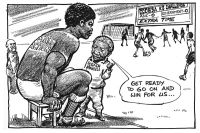
May 1992 - The African National Congress decides on "mass action" to press for the establishment of an interim government and elections for a constituent assembly - Len Sak
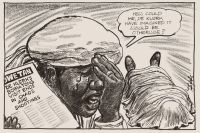
June 1992 - Armed attackers shoot and hack their way through the black township of Boipatong on the East Rand, leaving more than 40 people dead and scores injured, including women and children - Len Sak
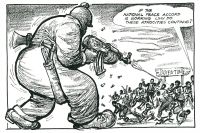
June 1992 - Armed attackers shoot and hack their way through the black township of Boipatong on the East Rand, leaving more than 40 people dead and scores injured, including women and children - Len Sak
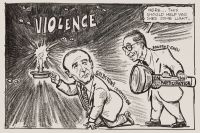
June 1992 - African National Congress President Nelson Mandela announces that he is suspending all talks with the government in the wake of the killings at Boipatong on the East Rand. He requests the United Nations Secretary-General to call a special Security Council meeting to discuss the massacre - Len Sak
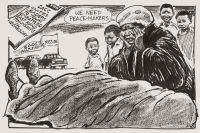
June 1992 - The South African Council of Churches makes a statement against the violence and calls for the renewal of the negotiating process - Len Sak
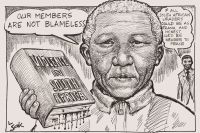
July 1992 - Following violent incidents between African National Congress (ANC) supporters and Inkatha Freedom Party members, ANC President Nelson Mandela admits that the organisation has disciplinary problems with some of its followers, particularly in the township "self-defence units". He promises to take action against those who abuse positions of power and authority - Len Sak
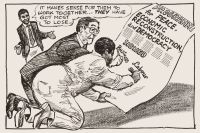
July 1992 - Cyrus Vance, Special Representative of the United Nations Secretary-General, arrives in South Africa for talks with a broad array of political, religious, business and labour leaders with a view to making teh widest possible recommendations - Len Sak
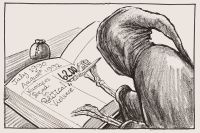
August, 1992 - The African National Congress and its allies lead millions of workers on a nationwide general strike to demand a multiracial interim government by the end of the year, and effective steps to halt violence - Len Sak
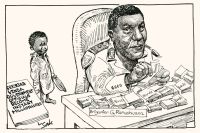
August, 1992 - Venda government officials are criticised for fraudulent activity regarding the calculation of pensions, resulting in their becoming instant millionaires - Len Sak
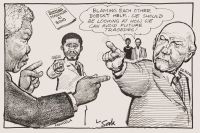
September, 1992 - Ciskei security forces fire on African National Congress demonstrators marching towards the capital of the homeland. Twenty-nine people are killed and more than two hundred are wounded in what became known as the “Bisho massacre.”
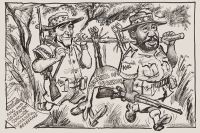
December, 1992 - To prepare for the resumption of negotiations, the African National Congress and the National Party hold a “bosberaad” between 2 and 5 December 1992 - Len Sak
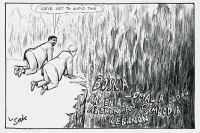
December, 1992 - The cartoon portrays the general sentiment of the time. The characters don’t represent anybody in particular, just a white South African and a black South African – Len Sak
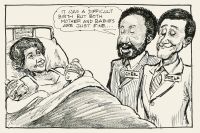
December, 1992 - The issue of media freedom is still very much with us – Len Sak
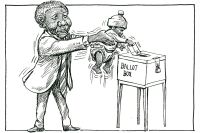
1993 - Nelson Mandela proposes to reduce the voting age from eighteen to 14. The idea is rejected by the African National Congress Executive Committee. Mandela loved this particular cartoon and was given the original - Len Sak
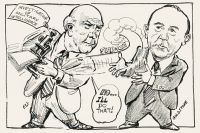
February, 1993 - Judge Richard Goldstone advises that the South African government undertake a major restructuring of the security forces and purge subversive elements in the military - Len Sak
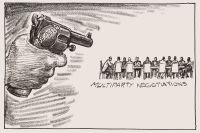
April, 1993 - The murder of South African Communist Party leader Chris Hani really could have pushed us into something absolutely horrific – Len Sak
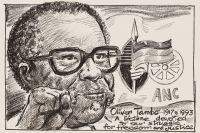
April, 1993 - African National Congress Chairman, Oliver R Tambo, dies - Len Sak
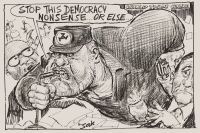
June, 1993 - Afrikaner Weerstandbeweging (AWB) members attack the World Trade Centre where the multi-party (Codesa) talks are held. – Len Sak
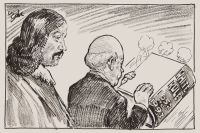
September, 1993 - The South African Parliament passes a bill establishing the Transitional Executive Council, whose main purpose is to ensure free and fair elections - Len Sak
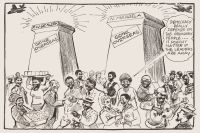
September, 1993 - Nelson Mandela addresses the UN Special Committee against Apartheid, calling on the international community to lift all economic sanctions against South Africa - Len Sak
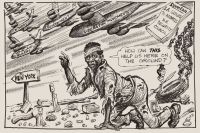
September, 1993 - Nelson Mandela addresses the UN Special Committee against Apartheid, calling on the international community to lift all economic sanctions against South Africa - Len Sak
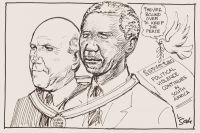
September, 1993 - FW de Klerk and Nelson Mandela are jointly awarded the Nobel Peace Prize - Len Sak
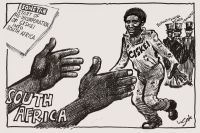
December, 1993 - Multi-party negotiators agree to the reincorporation of the TBVC states (Bophuthatswana, Ciskei, Transkei and Venda) into South Africa - Len Sak
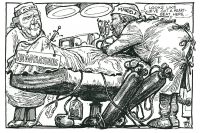
December, 1993 - Multi-party negotiators agree to the reincorporation of the TBVC states (Bophuthatswana, Ciskei, Transkei and Venda) into South Africa - Len Sak
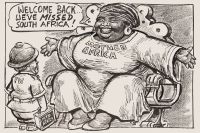
February, 1994 - FW de Klerk announces that South Africa's first non-racial democratic elections will be held on 26-28 April - Len Sak
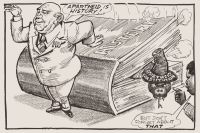
February, 1994 - FW de Klerk announces that South Africa's first non-racial democratic elections will be held on 26-28 April - Len Sak
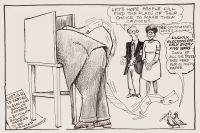
February, 1994 - Nineteen political parties register for the forthcoming April general election - Len Sak
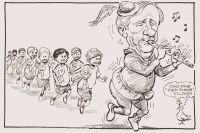
March, 1994 - General Constand Viljoen registers a new party, the Freedom Front, for the forthcoming April election - Len Sak
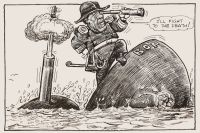
March, 1994 - Chief Lucas Mangope is deposed as leader of Bophuthatswana - Len Sak
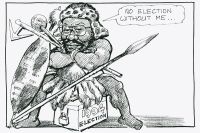
April, 1994 - The Inkatha Freedom Party agrees to participate in the elections. Zulu King Goodwill Zwelithini calls on his subjects to take part in the election - Len Sak
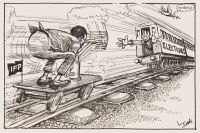
April, 1994 - The Inkatha Freedom Party agrees to participate in the elections. Zulu King Goodwill Zwelithini calls on his subjects to take part in the election - Len Sak
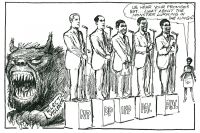
April, 1994 - The period before the election is characterised by violence. Due to the climate of fear many people stockpile provisions. However, the elections are conducted peacefully - Len Sak
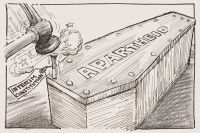
April, 1994 - South Africa's interim constitution enters into force. South Africa's new six colour flag is unfurled for the first time at the United Nations Headquarters - Len Sak
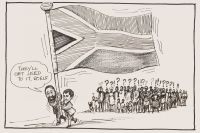
April, 1994 - South Africa's interim constitution enters into force. South Africa's new six colour flag is unfurled for the first time at the United Nations Headquarters - Len Sak
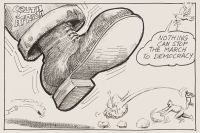
May, 1994 - Election results are declared on 6 May and deemed to be free and fair - Len Sak
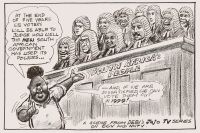
May, 1994 - Election results are declared on 6 May and deemed to be free and fair - Len Sak
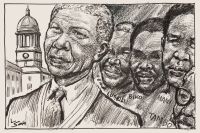
May, 1994 - Nelson Mandela is inaugurated as the President of South Africa on 10 May - Len Sak
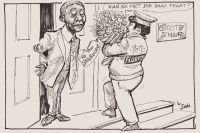
May, 1994 - Nelson Mandela is inaugurated as the President of South Africa on 10 May - Len Sak